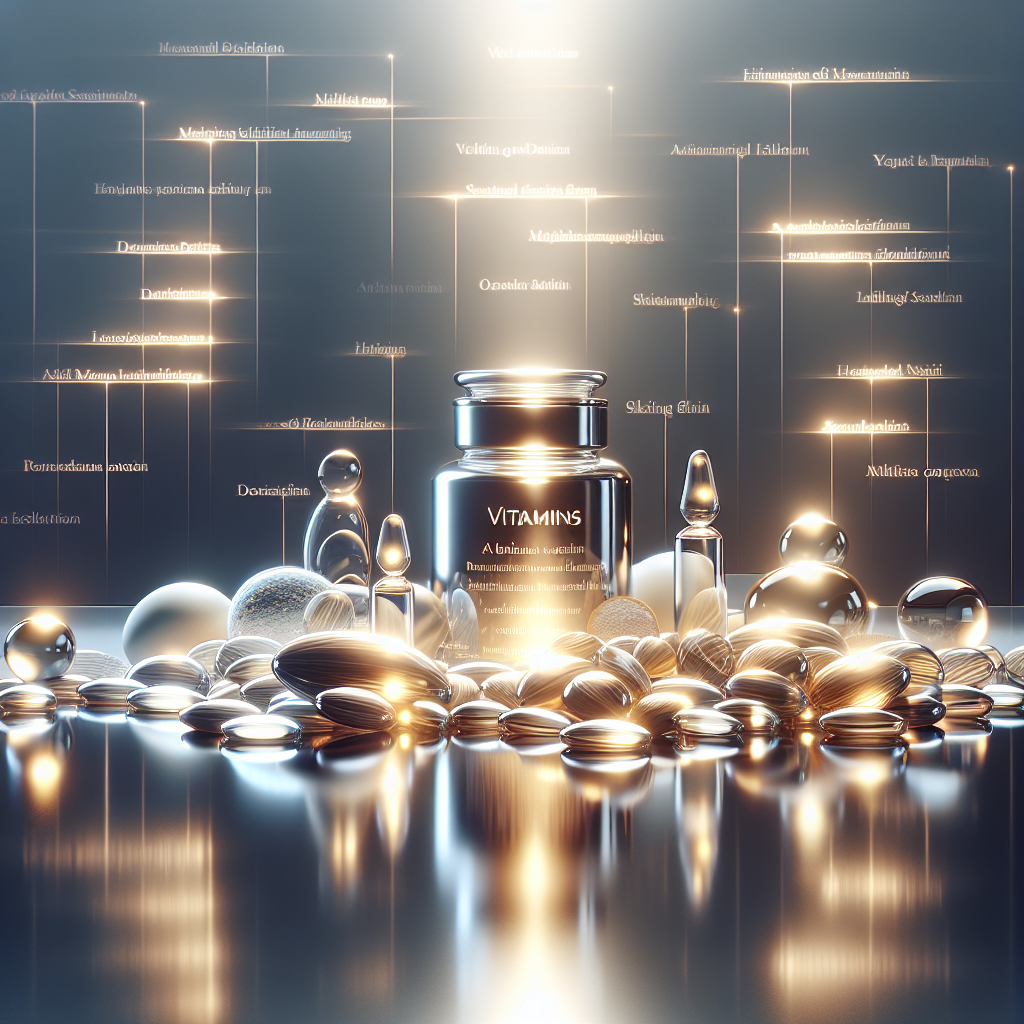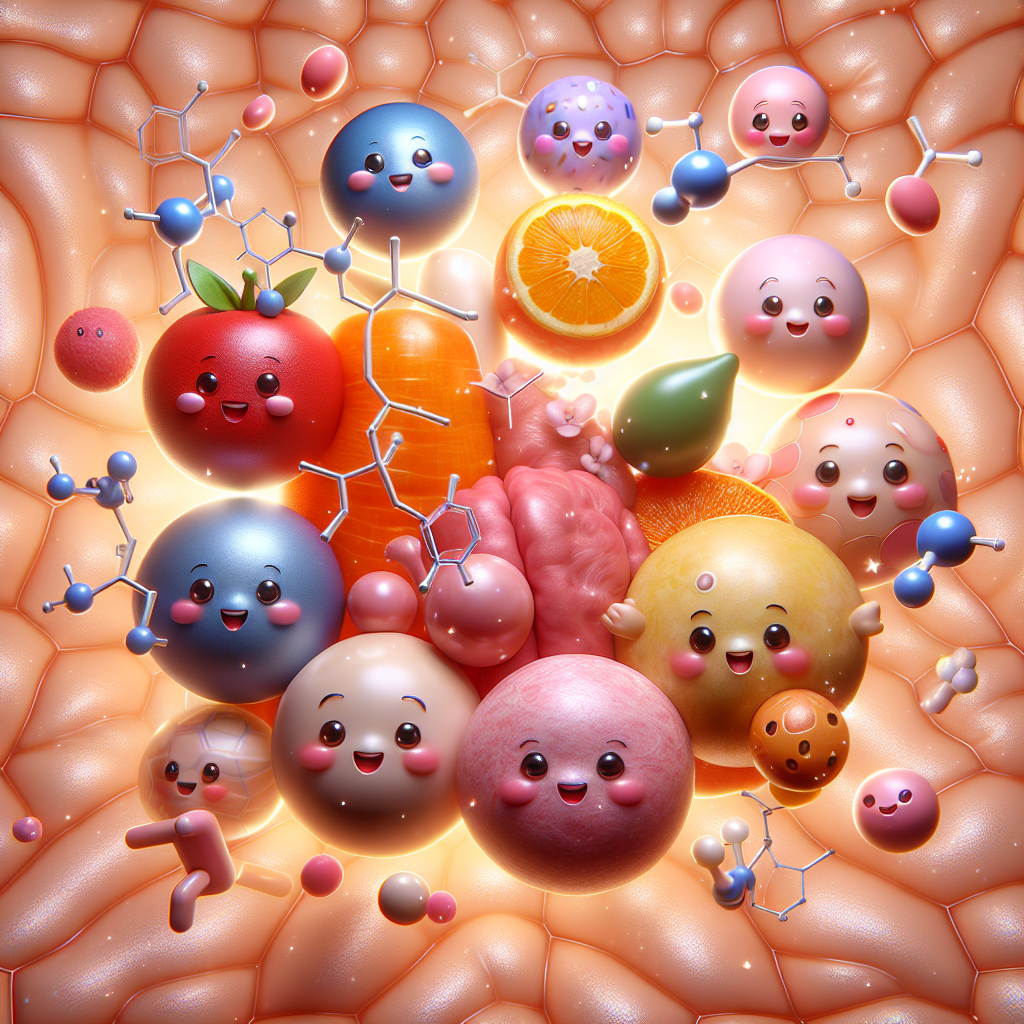Vitamins That Keep Skin Looking Youthful

Discover the secret to youthful-looking skin with our range of vitamins. Don’t wait, rejuvenate your skin today! Click here to explore our products.
Essential Vitamins for Maintaining Youthful Skin
The quest for youthful, radiant skin is a universal pursuit that transcends age, gender, and culture. While many turn to expensive creams, serums, and treatments, the secret to maintaining a youthful complexion may be as simple as ensuring you’re getting the right vitamins. Indeed, certain vitamins play a crucial role in skin health, contributing to its elasticity, glow, and overall appearance.
Vitamin A, for instance, is a powerhouse when it comes to maintaining youthful skin. It promotes cell turnover, which is the process by which the skin sheds dead cells and replaces them with new ones. This process is vital for keeping the skin looking fresh and vibrant. Moreover, Vitamin A helps to reduce the appearance of fine lines and wrinkles, making it a key player in the fight against aging.
Next on the list is Vitamin C, often hailed as a ‘skin savior’. This essential vitamin is a potent antioxidant that protects the skin from harmful free radicals, which are unstable molecules that can cause damage to our cells. By neutralizing these free radicals, Vitamin C helps to prevent premature aging and maintain the skin’s youthful appearance. Additionally, Vitamin C plays a crucial role in collagen production, a protein that gives the skin its firmness and elasticity.
Vitamin E, another antioxidant, works hand in hand with Vitamin C to protect the skin from environmental damage. It helps to moisturize the skin, keeping it hydrated and preventing dryness, which can lead to the formation of wrinkles. Furthermore, Vitamin E has been shown to reduce UV-induced damage, making it an essential vitamin for those who spend a lot of time in the sun.
Vitamin B3, also known as niacinamide, is another essential vitamin for maintaining youthful skin. It helps to improve the skin’s barrier function, which is the skin’s first line of defense against environmental aggressors like pollution and UV rays. By strengthening this barrier, Vitamin B3 helps to keep the skin hydrated and healthy. Moreover, it has been shown to reduce the appearance of hyperpigmentation, redness, and yellowing of the skin, contributing to a more even and youthful complexion.
Lastly, Vitamin K is often overlooked but is essential for maintaining youthful skin. It plays a crucial role in the body’s blood clotting process, which helps to heal wounds and bruises. For the skin, this means that Vitamin K can help to reduce the appearance of dark circles under the eyes, spider veins, and even stretch marks.
In conclusion, maintaining youthful skin is not just about what you put on your skin, but also about what you put in your body. A diet rich in vitamins A, C, E, B3, and K can significantly contribute to a radiant, youthful complexion. However, it’s important to remember that while these vitamins are beneficial, they are not a substitute for a balanced diet, regular exercise, and a good skincare routine. Always consult with a healthcare professional before starting any new supplement regimen.
The Role of Vitamins in Skin Anti-Aging

The quest for youthful, radiant skin is a universal pursuit that transcends age, gender, and culture. While many turn to expensive creams, serums, and even surgical procedures to maintain a youthful appearance, the role of vitamins in skin anti-aging is often overlooked. Vitamins, both consumed through diet and applied topically, play a crucial role in maintaining skin health and slowing down the aging process.
Vitamin A, also known as retinol, is one of the most potent anti-aging vitamins. It stimulates the production of new skin cells and encourages the growth of collagen, a protein that gives skin its elasticity and firmness. By promoting cell turnover and collagen production, vitamin A helps to reduce the appearance of fine lines and wrinkles, giving the skin a more youthful appearance. It can be found in foods like sweet potatoes, carrots, and spinach, and is also a common ingredient in many anti-aging skincare products.
Vitamin C is another essential vitamin for skin health. It is a powerful antioxidant that protects the skin from damage caused by free radicals, unstable molecules that can cause premature aging. Vitamin C also plays a crucial role in collagen synthesis, helping to maintain skin firmness and elasticity. It can be found in a variety of fruits and vegetables, including oranges, strawberries, and bell peppers, and is also available in topical form.
Vitamin E, like vitamin C, is a potent antioxidant that protects the skin from oxidative stress, one of the leading causes of skin aging. It also has anti-inflammatory properties that can help to soothe and calm the skin, reducing redness and irritation. Foods rich in vitamin E include nuts, seeds, and leafy green vegetables, and it is also widely used in skincare products for its moisturizing and healing properties.
Vitamin K is less well-known than the other vitamins mentioned, but it plays a vital role in skin health. It is involved in the body’s blood clotting process, which helps to heal wounds and bruises. Vitamin K can also help to reduce dark circles under the eyes, a common sign of aging, by improving blood circulation. It can be found in foods like kale, spinach, and broccoli, and is also available in topical form.
In addition to these vitamins, a healthy diet rich in fruits, vegetables, lean proteins, and healthy fats can provide a wide range of other nutrients that are beneficial for skin health. Regular exercise, adequate sleep, and good hydration are also essential for maintaining youthful, radiant skin.
While vitamins play a crucial role in skin anti-aging, it’s important to remember that they are not a magic bullet. They should be used as part of a comprehensive skincare routine that includes regular cleansing, exfoliating, and moisturizing, as well as protection from the sun. It’s also worth noting that while topical vitamins can provide immediate benefits, the effects of dietary vitamins are often more gradual, as they work from the inside out to improve overall skin health.
In conclusion, vitamins A, C, E, and K are essential for maintaining youthful, radiant skin. By incorporating these vitamins into your diet and skincare routine, you can help to slow down the aging process and keep your skin looking its best for years to come.
Top Vitamins to Incorporate for a Youthful Skin Glow
The quest for youthful, glowing skin is a universal pursuit that transcends age, gender, and culture. While topical skincare products and treatments play a significant role in maintaining skin health, the importance of nourishing the skin from within cannot be overstated. One of the most effective ways to achieve this is by incorporating certain vitamins into your diet. These vitamins not only contribute to overall health but also play a crucial role in maintaining the skin’s youthful glow.
Firstly, Vitamin A, also known as retinol, is a powerhouse when it comes to skin health. It aids in the repair and maintenance of the skin, promoting cell growth and differentiation. This vitamin is essential for the production of collagen, a protein that gives the skin its elasticity and firmness. By boosting collagen production, Vitamin A helps to reduce the appearance of fine lines and wrinkles, giving the skin a more youthful appearance. Foods rich in Vitamin A include sweet potatoes, carrots, and dark leafy greens.
Next on the list is Vitamin C, a potent antioxidant that protects the skin from damage caused by free radicals. Free radicals are unstable molecules that can cause oxidative stress, leading to premature aging of the skin. Vitamin C also plays a crucial role in collagen synthesis, helping to maintain the skin’s elasticity and firmness. Citrus fruits, strawberries, and bell peppers are excellent sources of this essential vitamin.
Vitamin E, another powerful antioxidant, works in tandem with Vitamin C to protect the skin from the harmful effects of UV radiation and environmental pollutants. It also has anti-inflammatory properties, which can help to soothe and calm irritated skin. Foods rich in Vitamin E include nuts, seeds, and spinach.
Vitamin B3, also known as niacinamide, is another essential vitamin for skin health. It helps to improve the skin’s barrier function, keeping it hydrated and protecting it from environmental damage. Niacinamide also has anti-inflammatory properties, making it beneficial for those with sensitive or acne-prone skin. Foods high in Vitamin B3 include chicken, tuna, and mushrooms.
Lastly, Vitamin K is often overlooked but plays a vital role in the body’s blood clotting process, which is essential for the healing of wounds and bruises. It can also help to reduce the appearance of dark circles and spider veins, making the skin look healthier and more youthful. Foods rich in Vitamin K include kale, spinach, and broccoli.
In conclusion, while topical skincare products and treatments are important, incorporating these vitamins into your diet can significantly enhance the health and appearance of your skin. However, it’s important to remember that everyone’s skin is different, and what works for one person may not work for another. Therefore, it’s always a good idea to consult with a healthcare professional or a dermatologist before making any significant changes to your diet or skincare routine. After all, achieving youthful, glowing skin is a journey, not a destination.